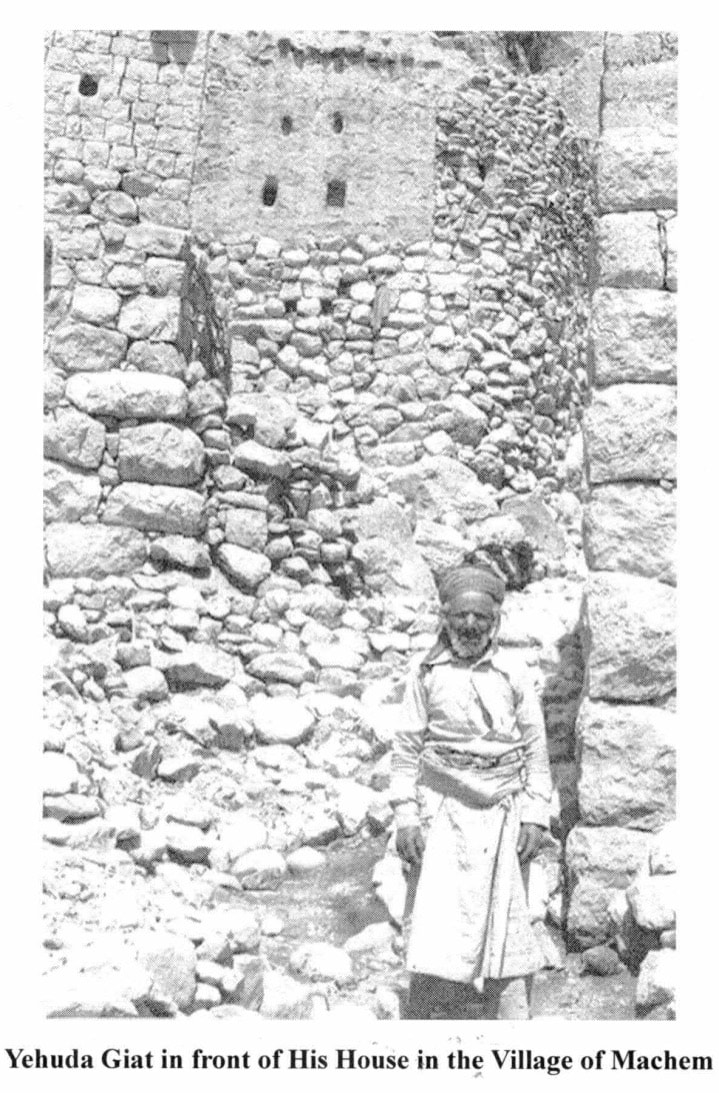|
Expulsion from Spain -- Return to Yemen
Jews have lived in Yemen for over 2,000 years.. One tradition suggests that King Solomon sent Jewish merchant marines to Yemen to prospect for gold and silver with which to adorn his Temple in Jerusalem. Another legend says that Yemeni tribes converted to Judaism after the Queen of Sheba's visit to King Solomon. The Sanaite Jews have a tradition that their ancestors settled in Yemen forty-two years before the destruction of the First Temple. It is said that under the prophet Jeremiah some 75,000 Jews, including priests and Levites, traveled to Yemen. After leaving Spain, one contingent of the ibn Giat family left Cairo and returned to Yemen, dropped “ibn” and lived again as Giat. The Giat family in Yemen distinguished themselves as rabbis, scholars and artists for centuries. However, the increasingly perilous situation led to the emigration of the Giats to Israel along with virtually the entire Yemenite Jewish community of almost 50,000 between June 1949 and September 1950 in Operation Magic Carpet. David Ha-Levi ibn Giat A Yemenite poet of undetermined time whose poems are collected in a volume published in the sixteenth century. Yichia Giat of Sana'a Yemen's largest city, Sana'a, has a street in the old town named Giat. Yichia Giat was born in Sana'a in 1846 and died in Jerusalem in 1913. His wife Rina Shechib was also born in San'a in 1846 and died in 1948 at the age of 102. Their youngest child, Yitzhak Ben Yiechia Giat was born in Menacha, Yemen in 1901. The Yichia Giat family immigrated to the Nahalat Zvi section of Jerusalem in 1903. Yehuda Giat of Machem In his book, My Memoir As An Activist For Israel And Yemenite Jews, Sampson Giat tells of his meeting with Yehuda Giat of the remote mountain town of Machem in 1992. "The man was probably in his forties but looked seventy. He wore a talit tied around his waist. ... His was the only Jewish family in Machem. What was amazing was that he was able to keep his Jewish identity while at the same time being surrounded by Muslims, alone, away from any Jewish community for so many years. Yehuda Giat and his wife [Masouda] looked as if they just had walked out of the Bible. They had five daughters and one son from ages one and a half to seventeen. Their home was made of rocks, mud, and straw with a mezuzah on the low hanging entrance. The area where the homes were located was like walking back into the twelfth century. ... He was very proud to show us the mikvah he had built for his family." [Photo left © Sampson Giat] Samuel Benghiat of Izmir and Aden Samuel Benghiat emigrated from Izmir to Aden. He had at least two sons born in Aden, Jacob and Joseph. Jacob Benghiat married twice. He had two children by his first wife, Samuel and Rosa (married Unknown Canoch). As a widower Jacob married Caden Camar from Hebron. Caden was previously married and had a daughter, Leah (married an Unknown Razon and had four children: Jacob, Pinhas, Rachel and Unknown Daughter). Caden’s husband left her and traveled to India, where she followed him to get a divorce. On the way back to Palestine she stopped in Aden and met Jacob. They married and had seven children: Mayer (married Estherine Capeluto and had four children), Abraham (married Unknown and had two children), Joseph, Palomba (married March Lehem and had three children), Rebecca (married Unknown Del Bourgo and had three children), Esther (married Shlomo Hasson and had one daughter) and Sarina. Jacob’s eldest son, Samuel, was born and died in Aden. He also married twice. His first marriage to Mazeltov produced three daughters, Victoria, Sarina and Joya. His second marriage to Rebecca Benezra produced four children, Matilda (married Morris Sasson and had two children), Mary married Unknown and had one daughter), Rosa (married Albert Cohen and had four children) and Nisso (Charles) (married Ida Leham and had four children). Matilda, Mary, Rosa and Nisso all left Aden to live in Palestine. Jacob’s brother, Joseph Benghiat, was a merchant working in Port Said, Egypt when his only child, Behora Emily, was born in 1882. Behora, married her cousin Ephraim Vital Benghiat (Vital) born in 1872, also an only child, but his parents are unknown. Vital worked in the British colonial police force and was decorated in 1908 by the Viceroy and Governor General of India and given the title of “Khan Bakhdour”. They moved to Egypt from Aden in 1917 with three children, Joseph Ephraim (Joe), Mary and David. During the Suez crisis of 1956, their descendents left Egypt for London and Paris. Brothers Behor and Victor Benghiat of Izmir and Aden Behor and his younger brother Victor ran the posh Hotel de l’Europe in Aden, frequented by maharajas and other wealthy travelers. I have acquired several picture postcards printed in Aden c.1890-1910. The postcard photo at the top of this page shows the Hotel de l’Europe; other postcards show various local scenes including the Camel Market, Sultan’s Mosque and Steamer Point Landing Pier. Printed on the address side: “Carte postale/Hotel de l’Europe/Turkish Shop/I. Benghiat & Son or J. Benghiat & Son or R. Benghiat, Photographer Registered Copyright”. Behor and Victor also ran a factory that made sweets in the oriental fashion, like marshmallows called lokum. Victor may have had a weakness for gambling, according to his grandson Isaac Benghiat. Victor had five children, Abraham, Isaac, Solomon, Joya and a second daughter. |
